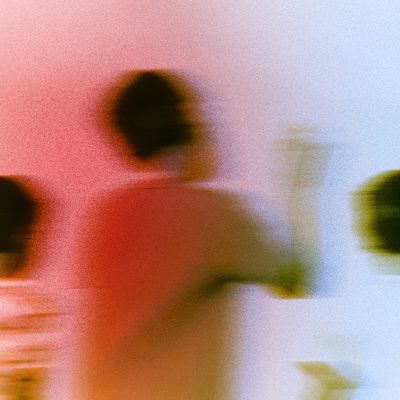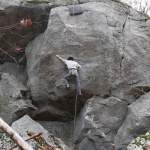
Barb, now 64, from upstate New York, spent most of her early adulthood purposefully eschewing parenthood. After college, she bounced around, teaching skiing in Colorado, West Virginia, Vermont, and finally, back in New York. By her late 20s, she’d moved back upstate and bought a shop — “a hippie place,” she says, that sold Birkenstocks and jewelry. For four years or so, she ran her shop and continued to teach skiing on the side, content with her quiet, independent life. She liked other people’s children, but wasn’t particularly interested in motherhood.
Then a trio of tragedies upended her world. Barb’s brother was killed by a drunk driver. Five years later to the day, her best friend was walking with her two children on the side of the road when a car mowed them down. All three died.
In between, Barb’s father committed suicide. “It was a pretty terrible time,” she says.
Grieving, Barb found herself at loose ends. “I was looking for purpose … for something,” she says. She wasn’t a religious person, but one day she found herself walking into a service at the Unitarian Christian church in her town. She kept going back until “something happened,” she says. “I felt like I was where I was supposed to be.” Without telling friends, Barb quietly enrolled in divinity school.
A few years later, after she’d begun her new career as a minister at a small Christian church, a friend called with a life-changing question: A teenager in their community needed help — would Barb take her in?
Surprising herself, Barb said yes, and became the teen’s unofficial guardian. She enjoyed working with her, and within a few months, decided to pursue training to become a certified foster parent. Over the next few years, she parented not just that teenager but a handful of other teens, too. “My job was to give them a safe space to be, to clothe them, feed them, and keep them in school. Some of them would talk to me a little bit about their past, but I didn’t push it. I learned to do a lot more listening than lecturing. I didn’t want them to have to relive their trauma,” says Barb. “I also learned how to pick my battles — how to be patient and allow them to make mistakes and be there for them when they tried to pull themselves back up.”
Then, in her early 40s, Barb had the opportunity to adopt two brothers, ages 2 and 9, who had been victims of extreme abuse and neglect. Barb had yet to raise children that young — but when she met them at the foster home where they were staying, she felt an instant connection. “I took one look at them, and that was kind of it,” she says. “The little one was asleep. The older one was chatty, showing off his football skills. I left, went home, called my contact at the agency, and said I’d do it. I just immediately fell in love.”
By 2018, Barb had fostered and taken in more than a dozen children and young adults and thought she was finished with that phase of her life. Her older son had moved out, and she was settled into a routine with her younger son, who was still in high school, and one of his best friends. “I ended up becoming his legal guardian because his home life wasn’t stable,” says Barb. “So it was the three of us.”
Then, one evening, Barb watched a news program about Catholic Charities, a nonprofit that was resettling refugee children from conflict zones in partnership with the federal government’s Unaccompanied Refugee Minors Program. Barb had been reading about the children separated from their parents at the border under Trump’s family-separation policy. “I was so sad for those kids, so I started thinking about fostering again,” she says. She called a local branch of the agency and learned that the children they placed all had parents who had died or stayed behind in conflict zones. Some of the kids had little chance of ever being reunited with their families.
Barb enrolled in a new set of classes required to become a host parent, and a month or so after she finished, she received a phone call from Catholic Charities.
“They said they knew of an Afghani teenage boy who was 17 and would be coming over from an Indonesian refugee camp in early November. They asked, ‘Do you want him?’ and I said, ‘Sure,’” Barb says. “Then a few weeks later they called again and said they had two more teenagers coming over, brothers who were 18 and 14. I told them they could come live with me too.”
Barb recounts the challenges and rewards of bringing three teenage refugees into her family and shares how the boys are doing now.
On meeting her first refugee foster son:
My two guys and I went to the Syracuse airport in the middle of the night to pick up Ali. (The names of Barb’s children have been changed throughout to protect their privacy.) When we arrived, Catholic Charities was there too. Poor Ali; he was skinny, scared. His English at the time was marginal. Here it was, the middle of the night, in a brand new place, where he didn’t know the language. He’s driving home with three strangers. I have a photo from that night, of all three of them in the airport: My guys have their arms slung around him. The look on Ali’s face: He was very tense. Stoic.
The plane ride had been long, so we asked him if he was hungry. I didn’t know if he ate a halal diet or not. He said he didn’t — so we passed a McDonald’s and got him a burger.
Ali had been through a lot; he had been in a refugee camp for years. His parents were still in Afghanistan. The U.S. hadn’t pulled out yet, but things were tense. He’d had an older brother who was killed and had two younger sisters — one of whom he’d never even met. He was worried about his family.
A lot of little things were foreign and uncomfortable for him. As soon as we got in the door of my home, I could tell he was nervous about my dogs. They have free rein in the house; they sleep on the beds with us. But Ali wasn’t used to that. He told me later on that in Afghanistan, dogs don’t usually live inside the house. That was an adjustment.
The next morning, Ali woke up and said he wanted to go to school. He didn’t skip a beat.
I had told the local high school that he would be coming. They were great about it — eager to accept him. He spoke Farsi, so the school worked with Catholic Charities to make sure there was someone there to translate and work with him at the school. That first day, we went and filled out paperwork, and Ali got a tour. He couldn’t wait to get started.
He came with almost nothing, just a knapsack, so that same week we went shopping at Target to get him shoes and jackets and clothes. I think the store was a little overwhelming for him. He looked a little shell-shocked.
On taking in two more refugees:
Ali had been with us for about a month when we welcomed Mahmud and Faizan, two brothers who had been smuggled out of Afghanistan and were living in a refugee camp in Ukraine.
Faizan was actually too old for the Unaccompanied Refugee Minors Program — the charity was resettling him as an adult asylum seeker. Initially, he and Mahmud were separated. For a night, the charity put him up in Syracuse in an apartment by himself. That was terrifying for him and for Mahmud, who was now by himself.
Imagine that: He’s separated from his older brother, and now he’s in a strange car with this strange woman. Ali had been quiet with him in the car, but when we got home, he spoke to Mahmud in Farsi. I think he could tell how scared Mahmud was. Even the dogs could tell. When Mahmud went to bed that night, one of the dogs went upstairs to sleep with him.
We drove the hour to Syracuse the next day to see Faizan and let him know we were working on bringing him to move in with us. Catholic Charities hosted a dinner that night for a bunch of the children in the Unaccompanied Refugee Minors Program, and the boys just sat together and talked and talked. I think being back with his brother made Mahmud feel better. It took us a couple of weeks to sort out. When it was all settled, and Faizan was finally with us, the boys were relieved.
Just like Ali, Faizan and Mahmud wanted to go to school right away. They spoke a little bit of English, and could read it and write a little bit too; just like Ali, they’d learned from watching American cartoons, from taking classes online, and from going to school in the refugee camps. They arrived with phones — Catholic Charities had bought them phones and computers and helped financially in other ways with a clothing and food allowance. The boys started off with a translator at school, but pretty quickly, within a month or so, they didn’t need the translator anymore. They just used a translation app on their phones. They were only in ESL classes for a couple months.
I also hired a tutor for them, a person I knew locally; Catholic Charities also paid for that. But honestly, they didn’t need a ton of help. I’ve taken care of a lot of kids, and many of them struggled in school. But these guys were special, really bright and really motivated. All of them ended up on the honor roll.
On gradually learning the boys’ stories:
As the boys’ language improved and they got more comfortable with us, they started telling us more of their stories. Ali comes from an ethnic group in Afghanistan with a history of being targeted by the Taliban and other groups. At 13, Ali told his parents he wanted to leave, to be safe and get an education abroad. His parents agreed and found out how to get him smuggled out of the country. He made it to Jakarta — but when he got to the UN shelter where he was supposed to go, he was told it was full. He told us he slept outside the shelter for 20 days in a cardboard box. People would walk by and feed him. Sometimes, he said, he was so hungry he was too weak to walk.
Eventually he made it inside, and he lived there for three and a half years. Finally he was vetted and identified by the UN for the Unaccompanied Refugee Minors Program, which is how he finally made it here.
Faizan and Mahmud had also been through a lot. It was a really sad story. Like Ali, they had an older brother who had been murdered in Afghanistan. Mahmud had watched it happen. The boys also had an older sister and a younger brother who’s a couple of years younger than Mahmud. The very next day, after their brother’s murder, their father brought them to Kabul to get them smuggled out. The boys were 11 and 15 at the time.
It was confusing for Mahmud, especially; it happened so fast. They said they had to climb through fences, run behind horses, sleep outside; at one point, they got shot at. Somehow they made it to Ukraine, to a UN refugee camp. They lived there for four years.
One time, months after the boys had moved in, we watched a movie about Harriet Tubman and the underground railroad. Faizan said: “That’s my story.”
On the boys’ slow and sometimes difficult adjustment:
Before the boys arrived, I tried to do a little research to find out how to make them comfortable. I sometimes do chaplain work at a local college, and I’d gotten to know a student there who was originally from Afghanistan. I reached out to her and asked about what the boys might want to eat and what they’d need to pray.
I was really impressed by how welcoming the school was. The boys are devout Muslims, so the school set aside a room where they could pray. In fact, if one of them forgot it was time, one of the secretaries would come and get them and tell them.
There are a couple of stores I knew of that sold things I thought they’d need — prayer rugs, spices, foods they like to eat. We took a couple of trips early on to pick things up. Ali likes to cook, so he picked out what he needed: spices, grains. He told me he needed a rice cooker, so I went out and bought one.
I’m not much of a cook, but the boys were polite; they always ate what I made — macaroni and cheese, ground-beef tacos. But then Ali started cooking for everybody. He really enjoys it. I’d have people over and he’d want to cook for everyone.
All the boys did great. But they had their moments. Faizan had a hard time letting me take care of Mahmud. He’d been taking care of Mahmud for four years; I think it was hard for him to let go of that responsibility and let me be in charge. He and I had an argument once about men and women. He said that men should be the head of the household. “Not here!” I told him. He was very protective of Mahmud.
Mahmud and I got very close. It took him a while — but once he started hugging me, he wanted a lot of hugs. He would open up to me. When he saw families at the park, it would make him so sad. He just missed having a family so much. He was so little when he left, just a sweet little soul. I don’t think he ever cried in front of me, but he liked me to hold him. Sometimes he had nightmares, memories of what he’d been through.
Catholic Charities offers mental-health support, and the boys took a couple of calls with a counselor early on. But they didn’t feel they needed it and stopped. That isn’t to say they don’t; but they didn’t want to do it. So I didn’t push.
On watching the boys succeed:
All three boys had only been with me for a little while when Christmas came. I decided to take all five of them — the three of them and my son and his friend — down to Washington, D.C., for the holiday. We all bonded on that trip and became kind of a unit. The boys started to relax.
Watching them bond was really kind of amazing. My son and his friend befriended Ali, Faizan, and Mahmud right away.
We had a lot of fun. During COVID, when they were remote learning, the five of them would go off on these adventures. They went fishing one time and brought back this huge fish. We had a McDonald’s eating contest. We went hiking. I taught them to ski. They all went to prom. Ali and Faizan both got jobs, washing dishes and then bussing tables. When Mahmud was old enough, he started working too.
Mahmud is really cute and started getting a lot of attention from girls, which was new for him. In Afghanistan, I think it was sort of taboo for the boys to talk to girls, but here girls were throwing themselves at him. So that was an adjustment. The boys liked to joke around with him about that.
There were funny moments. My youngest taught them some slang. He used to say “What’s up?” to Faizan, and Faizan didn’t get it. He would literally look up. We laughed about that.
By the end of their first year here, all of them were thriving. Ali is a great soccer player, so he made a lot of friends on the varsity soccer team. He got his driver’s license in nine months, and used the money he earned at work to buy his own car. I co-signed a loan for him, and he made the monthly payments.
On finding the brothers’ family:
Ali had been in touch with his family all along via WhatsApp. They were still back in Afghanistan. But Mahmud and Faizan had lost contact with theirs and didn’t know if they were alive or dead. I contacted the Red Cross to see if we could find them, and they weren’t hopeful. “It’s like finding a needle in a haystack,” they said.
Then, in 2021, about two or so years after they’d come to live with me, something amazing happened. At 4 a.m. on a school day, I happened to be up and saw I’d gotten an email from the UN. There was a family in Tajikistan desperately searching for their sons, and the UN thought they were looking for my boys. I get choked up thinking about it.
After we communicated a little bit, it seemed clear that Mahmud and Faizan were definitely who they were looking for. So I woke up the boys and told them. Faizan was beside himself with excitement. Mahmud sort of just sat there in shock. It was a lot to take in.
We had to wait a couple of hours because of the time difference. We were all really nervous. Then the video call came through on WhatsApp, and it was them — it was their parents. It was incredibly emotional. After six years of not knowing if they were alive or dead, there they were.
I think it was harder for Mahmud in a way. I don’t know if he recognized them right away; by that point, I’d become his mom. It had been six years since they left, which is a big chunk of time in a kid’s life.
We stayed in touch with their parents after that, and I learned more of their story. They’d spent years checking coffins coming into Kabul to see if any held their sons. Finally, their father got in touch with a smuggler who confirmed they’d made it to Ukraine. Their father speaks excellent English. The boys hadn’t known it – they’d thought he was a shopkeeper — but he was actually a radio producer who’d done work for western media. They decided to leave Afghanistan right before American troops pulled out and the Taliban stepped back in. That’s how they got to Tajikistan.
Once the boys connected with their parents, they stayed in touch. Their sister had gotten married and moved to Belgium, and they connected with her too. Then, last summer, Faizan got a call from his younger brother: He and their parents were on a plane, he said, about to fly to Canada. Their sister was also flying in. They wanted to meet up with Faizan and Mahmud.
The boys were so excited. A couple of weeks later, we drove up to Canada. It took us forever to get there. Mahmud and Faizan were so nervous, we kept having to pull off for a break. When we met up at a hotel, Faizan leapt out of the car before I’d even put it into park.
It was super-emotional. Their mom kept hugging and kissing me. Mahmud was reserved. He hung back a little bit, behind me. It took him a while to warm up. His mother looked at me and said, “He’s your boy now.”
But she and his dad were really good about it. They gave him space. They’ve stayed in touch, and they’re getting closer. The family settled in Canada, and the boys have gone up to see them four or five times now. I think the boys feel responsible for them; their family has been in Canada for a year, and it’s been hard for their dad to find work. He’s taking continuing education classes at a local university in technology. The boys want to do whatever they can to help.
On the boys’ independent lives today:
All three of the boys are sophomores in college now. Ali is 23, Faizan is 24, and Mahmud is 20. Ali still lives with me and commutes, and the other two are on campus.
I think they’d love to be able to go back to Afghanistan someday; it’s their homeland. They tell me how beautiful it is, how gorgeous the mountains are, how you can pick fruit right off the trees. But for now, they’re making a life here. They all want to become citizens. Ali is planning on applying next summer; we’re going to have a party. Eventually he wants to bring his family over. It’s going to be a long process.
They’ve managed to locate a bunch of people they got to know when they were on the run. Just the other day, two friends who’d been in the shelter with Ali in Indonesia came to visit us.
Mahmud and Faizan have also kept in touch with a teacher they met in Ukraine, who helped them learn English while they were in the refugee camp. They had been close to him; he’d taken them to the airport for their flight to the U.S. When the war in Ukraine started, he and his family were displaced. Now, that man and his family are refugees here in the States. They came to see us last spring. It’s incredible and ironic: Now they’re here and we’re helping them.
I miss having the boys around all the time. They’ll always have a home here. This was probably my last time fostering. I’m older now.
There are an awful lot of kids out there who are suffering. You can’t fathom what they’ve been through. You can look at them and judge them, but until you know their story, you can’t understand. Everybody has a story.
More From This Series
- The Dad Who Became a Widower at 30 With 8-Month-Old Twins
- The Mom Who Was Fired a Week Before Her Due Date
- The Couple Whose Twins Survived Birth at 22 Weeks




